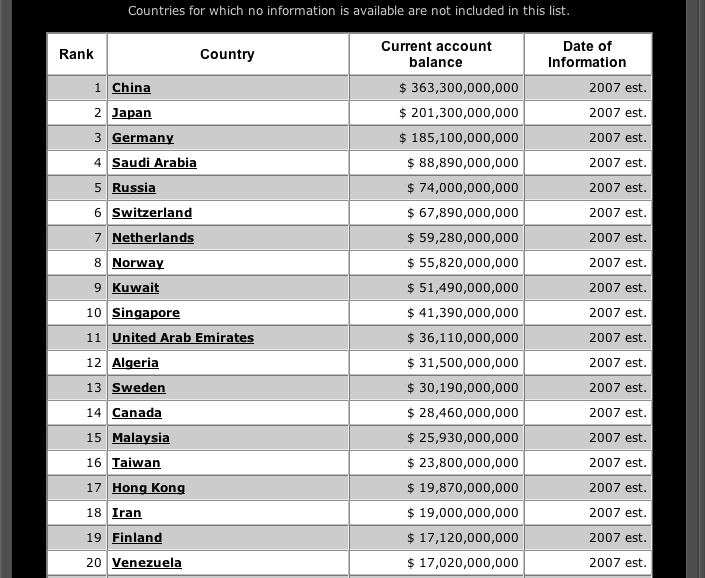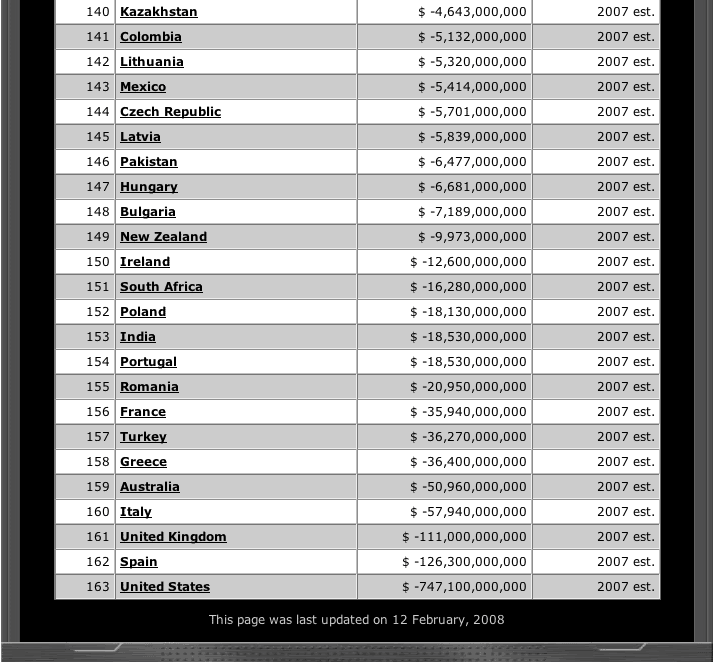Wow. Just, wow.
CIA World Factbook


But wait, there's more.
The Australian, via TPM


But wait, there's more.
Professor Stiglitz told the Chatham House think tank in London that the Bush White House was currently estimating the cost of the war at about $US500 billion, but that figure massively understated things such as the medical and welfare costs of US military servicemen.
The war was now the second-most expensive in US history after World War II and the second-longest after Vietnam, he said.
The spending on Iraq was a hidden cause of the current credit crunch because the US central bank responded to the massive financial drain of the war by flooding the American economy with cheap credit.
"The regulators were looking the other way and money was being lent to anybody this side of a life-support system," he said.
That led to a housing bubble and a consumption boom, and the fallout was plunging the US economy into recession and saddling the next US president with the biggest budget deficit in history, he said.
Professor Stiglitz, an academic at the Columbia Business School and a former economic adviser to president Bill Clinton, said a further $US500 billion was going to be spent on the fighting in the next two years and that could have been used more effectively to improve the security and quality of life of Americans and the rest of the world.
The money being spent on the war each week would be enough to wipe out illiteracy around the world, he said.
Just a few days' funding would be enough to provide health insurance for US children who were not covered, he said.
The public had been encouraged by the White House to ignore the costs of the war because of the belief that the war would somehow pay for itself or be paid for by Iraqi oil or US allies.
The Australian, via TPM

 Since 1949, Durhamites have slept soundly, secure in the knowledge that, in our town, erection can be depended upon. Now, thanks to the power of the internets, we can spread that security all over the world.
Since 1949, Durhamites have slept soundly, secure in the knowledge that, in our town, erection can be depended upon. Now, thanks to the power of the internets, we can spread that security all over the world.

6 Comments:
We're winning!
Okay, which account balance are they talking about?
By Valerie at We Love Durham, at 5:07 PM
Valerie at We Love Durham, at 5:07 PM
Current accounts generally refers to the difference in imports v exports over time, which have to be financed somehow.
Basically, the US has bought about 700 billion more than it's sold in recent years. That debt is more than likely held by the trading partners who sold us the stuff in the first place, mainly China. That's why their numbers are positive.
By Barry, at 5:11 PM
Barry, at 5:11 PM
VEry basic discussion of calculating current accounts at Wikipedia.
Given that the dollar has depreciated by about half against the Euro in the past 6 or so years, and is at all time lows against many of the worlds' other currencies, it's pretty scary to see the current accounts deficit so large. Or at least, it should be. Scary, that is.
When Bush took office, the dollar was buying 1.07 Euros. It got as high as about 1.2 Euros. Historical currency exchange calculator here)
Today, the dollar buys around .66 of a Euro.
Put another way, if a barrel of oil cost $50 bucks when the exchange rate was 1/1.2, then that barrel of oil cost 60 Euros. If the same barrel of oil sells for $100 when the exchange rate is 1/.66, then the oil costs 66 Euros.
So, we're paying twice as much for oil as we were before invading Iraq. Europeans? Only 10% more.
Thanks, George.
By Barry, at 6:03 PM
Barry, at 6:03 PM
I am proud that my kinfolk in Poland owe us
$ 18,130,000,000.
Embrace your brothers!
Er, might wanna start learning Mandarin, OR I think I know where all those Chinese men are gonna find wives in the next couple of years.
Newark!
By Tony, at 7:10 PM
Tony, at 7:10 PM
So what?
People ask me all the time "you work for a swiss bank -- should I be concerned about the falling dollar? Should I open a foreign account?"
Not if you plan to retire in the US.
If you're a paranoid libertarian who fears that confiscatory tax rates could ruin your retirement, maybe.
By KeepDurhamDifferent!, at 8:26 PM
KeepDurhamDifferent!, at 8:26 PM
Ah, I've never heard it called "current accounts." I knew that was what the trade balance looked like in general, but had no idea the numbers were so big (or small, as the case may be).
By Valerie at We Love Durham, at 9:58 PM
Valerie at We Love Durham, at 9:58 PM
Post a Comment
<< Home